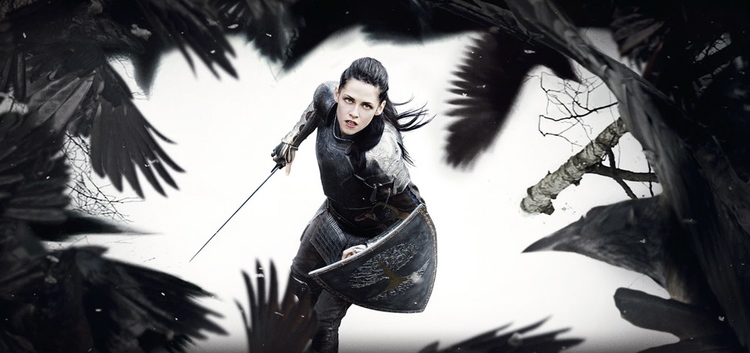
NYT: Is Hollywood Finally Ending Its War On Women By Sending Women To War?
By Steve Sailer
12/09/2012
In December of each year, The New York Times film critics, like film critics everywhere, write Deep Think pieces about what patterns in the movies released in the current year tell us about Trends in the Big Issues. The annual answer ought to be: Virtually nothing, because what gets released in a single year is a close to a random sample of projects that had been in the works for years and happened to come to fruition now. But that never stops the critics from pontificating on 2012: The Meaning of It All.
Not surprisingly, they are still using Obama Campaign talking points.
A.O Scott starts out by recounting that some nobody in some nowheresville (Buffalo?) complained about Snow White and the Huntsman being yet another Butt-Kicking Babe movie in which a 105 pound starlet whomps on bad guys in hand-to-hand combat.
The picture’s apparent reversal of gender norms — this Snow White wears armor, wields a sword and leads an army into battle — struck Parlato (who does not seem to have seen it) as emblematic of “a Hollywood agenda of glorifying degenerate power women and promoting as natural the weakling, hyena-like men, cum eunuchs.”
Neither the NYT scribe nor the nobody in Buffalo seem to notice that the main audience for Butt-Kicking Babe movies are nerdier guys who wish women would be interested in the kind of stuff they are interested in: weapons, fighting, quests, and so forth.
A Hollywood agenda of glorifying powerful women — now that is news. Granting that Parlato’s rant seemed to emanate from the same zone of the culture-war id that undid a few Republican Senate candidacies this year, you might still be inclined to wonder if, in sensing a shift in the portrayal of women, he was onto something — or for that matter to hope that he might have been.
In reality, Snow White and the Huntsman was least interesting for its Butt-Kicking Babe aspect — pothead Kristen Stewart’s under-energized Snow White has been dropped from any sequel, with Chris Hemsworth’s Huntsman more likely to carry. And it was most interesting for Charlize Theron’s Wicked Witch, because evil women characters, such as that Golden Age of Hollywood mainstay, the femme fatale, have largely disappeared due to a combination of feminism and movies being aimed at younger, more innocent males who are more idealistic about girls.
After all, the contrary complaint — that Hollywood is a swamp of testosterone, turning out entertainment that marginalizes or condescends to women when it does not ignore them entirely — has been around much longer, and has, to say the least, a much stronger grounding in reality. Have things really changed that much?
Movies are more masculine than advertising-funded media because they are largely paid for by ticket-buyers, and, on average, males pay for movie tickets more than females. There are plenty of roles for actresses of a certain age solving murder mysteries on TV, because advertisers love the women’s market, because women spend more than men, because men turn more of their income over to women than vice-versa.
There is a smattering of evidence to support the impression that they have, because 2012 was, all in all, a pretty good year for movies and also a pretty good year for female heroism. In addition to “Snow White and the Huntsman,” there was “Brave,” whose flame-haired heroine, Merida, combined Disney-princess pluck with Pixar’s visual ingenuity; “The Hunger Games,” which drew on young-adult literature to find, in the resourceful person of Katniss Everdeen (played by Jennifer Lawrence), a new archetype of survivalist girl power; … And we should not forget the culmination of the “Twilight” saga, speaking of Kristen Stewart, whose Bella Swan, grown from a sulky, indecisive teenager into a fiercely protective vampire mother, fought alongside her in-laws against the supernatural forces of evil. Forget about Team Jacob and Team Edward: it was Team Renesmee that triumphed in the end.
Of course it would be silly to proclaim, on the basis of a handful of movies, that some kind of grand role reversal has taken place, that cultural power has shifted toward women, or even that 2012 is yet another “year of the woman,” a wishful phrase that surfaces periodically in movies as it does in politics.
Let me focus on Twilight, Brave, and The Hunger Games, because those are coming from farther right in the cultural landscape than normally makes it into movies. Twilight is a woozy Mormon fantasy, Brave comes from Pixar (which long ago set itself up in Northern California to stay out of the Hollywood cultural orbit), and The Hunger Games novels were written by a woman trying to channel her military historian father.
The big innovation in Brave and The Hunger Games in the Butt-Kicking Babe genre is that the heroine does not fight with her fists or feet, a gun, or a sword, but with the more culturally traditional bow. Of course, this is an ancient trope, going back to Diana/Artemis. Archery was extremely fashionable among mid-Victorian maidens because it gave them an excuse to show off their legs in Robin Hood-style tunics and tights. (One contemporary complaint was that because archery was so fashionable, girls wouldn’t wear their glasses while shooting, and thus many couldn’t even see the target or perhaps even the bale of hay the target was pinned to.)
